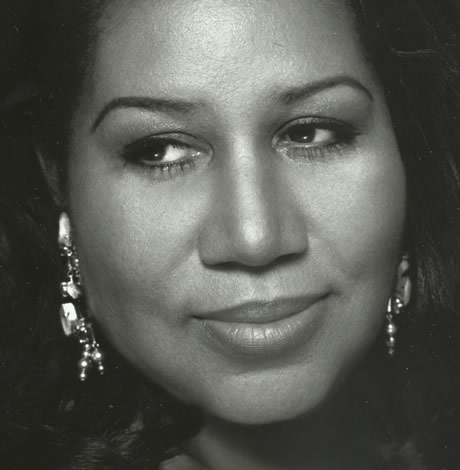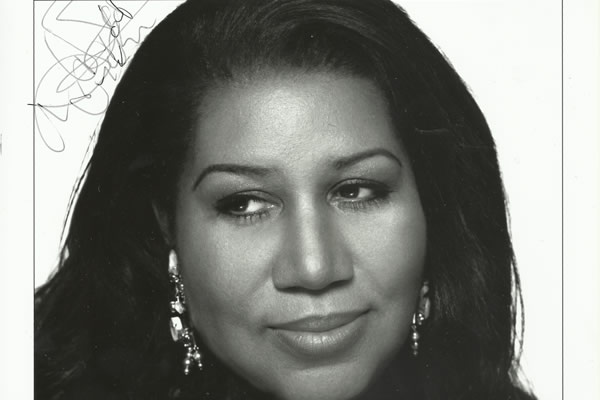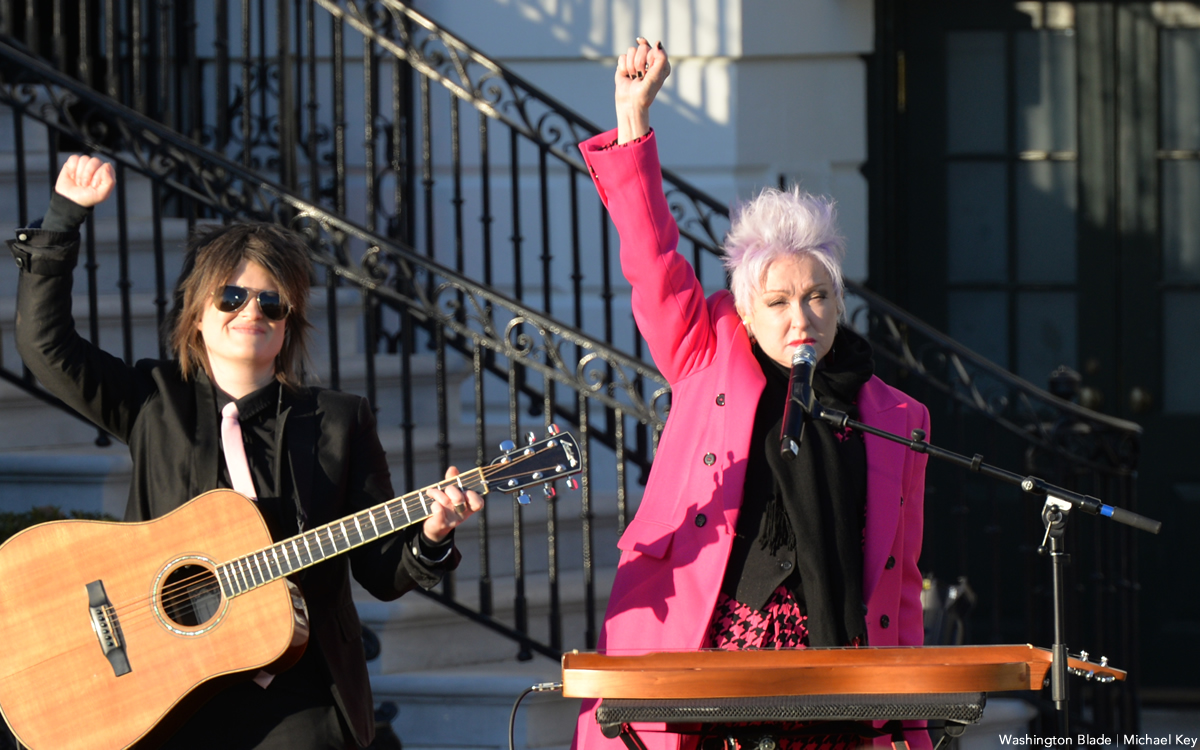Music & Concerts
Aretha’s ups and downs: a posthumous appreciation
Soul legend transcended erratic chart stats, uneven musical output


An assistant to Aretha Franklin handed out these autographed 8×10 glossies to fans gathered outside a stage door at Pittsburgh’s Heinz Hall during the singer’s ‘The Queen is On’ tour on Oct. 25, 2003. It was billed at the time as her farewell tour, but Franklin continued concertizing throughout the next 14 years. (Photo by Kwaku Alston; courtesy Arista Records)
Aretha Franklin’s career accomplishments were, of course, impressive — 18 competitive Grammys (only Beyonce with 22 and Alison Krauss with 27 have her beat among women), first woman inducted into the Rock & Roll Hall of Fame and a gravitas in the culture that meant when the U.S. wanted to put its best foot forward — Obama’s inauguration, Pope Francis’ stateside visit — Franklin was the go-to performer (oddly, those two performances were among her less memorable musically).
In a way, Franklin’s accomplishments are a bit curious. She was more a singles-oriented artist, so her various albums (often cobbled together from various recording stints not necessarily recorded with any cohesive statement in mind) never went through the roof. When the 1985 title “30 Greatest Hits” reentered the Billboard chart last week at No. 7 upon news of her death, it was her highest-charting album since her landmark gospel masterpiece “Amazing Grace” made it to no. 7 way back in 1972.
There were also long stretches where Franklin went eons between albums and even when she did release them, they sometimes barely made blips on the charts. Beyonce is, of course, an arbitrary comparison in many ways — she and Franklin are of different eras — but a Beyonce album is always an event. All six of her studio albums have hit the top spot, while Franklin never once had a no. 1-selling album. During her hottest era upon first signing with Atlantic in the late ‘60s, the top spot proved evasive with 1967’s “I Never Loved a Man” peaking at no. 2, “Aretha Arrives” at no. 5, “Lady Soul” at no. 2 and “Aretha Now” at no. 3.
Later releases sometimes tanked for decent records like “Through the Storm” (no. 55) and “What You See is What You Sweat” (no. 153), unthinkable numbers for a Beyonce or a Mariah Carey. Franklin was 47 when “Through the Storm” came out in spring, 1989. Carey was 45 when her last album, 2014’s “Me. I Am Mariah …” made it to no. 3. For some hard-to-pinpoint reason, Franklin never developed the fiercely loyal fan base that ensures veteran acts top 10 album releases even decades after their heydays.
And although Franklin’s overall Billboard Hot 100 chart heft is impressive — she held the women’s record with 73 entries until Nicki Minaj broke it (mostly with a legion of “featured artist” cameos) last year — she only hit the no. 1 spot twice (with “Respect” and “I Knew You Were Waiting For Me,” a George Michael duet) compared to Carey’s 18 no. 1 Hot 100 hits, Rihanna’s 13 and Madonna and the Supremes’ 12 each. Franklin did rack up a bounty with 20 no. 1s on the R&B chart.
And Franklin — friendly with gay men but rarely outspoken about gay rights — had a relatively meager three platinum (1 million copies certified) albums in her whole career (two were for compilations) and just one certified double platinum album (“Amazing Grace”). She never had a monster-selling legendary album like a “Rumours” (Fleetwood Mac, 20x platinum), a “Come On Over” (Shania Twain, 20x platinum), or a “Jagged Little Pill” (Alanis Morissette, 16x platinum). And yet could you imagine Twain or Morissette being called upon to perform for the pope or a historical presidential inauguration? Hardly.
What I’m getting at is that despite an impressive track record in all the usual ways we measure music industry success, Franklin’s stats are not quite what you’d think they would be considering her cultural impact.
There’s no question about it — her output is uneven. Put any of her studio albums on at random and track for track, you’re just as likely to encounter filler as grandeur. There are moments to enjoy on them all — all of which I own — but efforts like “Hey Now Hey,” “You,” “Sweet Passion,” “Almighty Fire” and “La Diva” are erratic. “A Rose is Still a Rose” (1998) was her last great album although 2003’s “So Damn Happy” is underrated and quite good. Later efforts like “This Christmas Aretha” (2008) and “A Woman Falling Out of Love” (2011) are almost painfully bad despite glimmers of magic.
So what gives exactly? In some ways I feel Franklin was underrated; in other ways I think it’s remarkable what she managed to achieve considering how up and down her overall quality — admittedly a subjective assessment — was. Franklin, especially in later years, did things her way. She would never have handed over a project to an outside producer the way, say, Loretta Lynn did with her classic “Van Lear Rose” album that Jack White produced in 2004 or the way Johnny Cash did with his American Recordings series with Rick Rubin which gave him a nice victory lap in his final years. Impresario Clive Davis held some sway with Franklin — we can largely thank him for Franklin’s final studio effort, 2014’s solid “Aretha Franklin Sings the Great Diva Classics,” but only to a point. Even some of the ‘80s work they collaborated on like “Jump To It” (1982) and “Get it Right” (1983) (both of which Luther Vandross produced) are hit and miss.
But while Franklin’s choice of material was often uneven, her interpretive abilities were nearly peerless. She knew how to unfurl her trademark improvised melismas with a finesse that never sounded overwrought as it often does in lesser hands (I’ve heard singers whoop and dip so recklessly they end up in different keys than they began). Were a lesser singer (and many have) to have taken the luxuries of tempo and pacing Franklin did on the title cut of her “Amazing Grace” album, for example, for most, it would sound ridiculously self-indulgent and extreme.
“Would you just sing the damn song already,” as a friend of mine used to say about such musical excesses. It’s just a “thing” in the black gospel tradition, though. A singer I used to work with at the Blade — we’d sometimes goof off watching YouTube clips when we should have been working — would say of this approach, she took a common song and “made it her own,” which is exactly what Franklin does with expert pacing, theatrics and phrasing.
Many of the obits this week have erroneously referred to her as a mezzo soprano, a tessitura usually associated with opera (Franklin, of course, did sing opera a bit later in her career, but always in a very “Aretha” style; she didn’t possess anything like a Leontyne Price-type voice, nor did she pretend she did). Franklin’s range, even in the ‘60s-‘70s was never stratospheric (Patti LaBelle has higher notes at her disposal, for example) but Franklin’s interpretive abilities were so solid, you never really thought much about what her range exactly was. After she quit smoking in the early ‘90s, her range expanded noticeably. Just think of the big finale number of “Natural Woman” from the first VH1 “Divas” show back in 1998. Who was caterwauling (Celine) and who was holding court (Aretha)? And who was relegated to the sidelines (pretty much everyone else)?
I was lucky to have seen Franklin live in concert eight times over 20 years, all but once in the D.C. area. I tried to go every time she was in town and saw her many times at Wolf Trap, at Constitution Hall and other venues. Her shows — like her studio albums — could be everything from head scratching to transcendent. I kept going back because there was never any doubt, even in her later years, that I was in the presence of greatness. As another friend of mine likes to say, Aretha takes your ass to church. Of course, it was always fun to hear “Chain of Fools,” “Respect” and “Don’t Play That Song,” but the moments I enjoyed most were the gospel numbers like “Old Landmark,” “Amazing Grace” or sometimes not even a song, just an extended, black church-style gospel vamp in which Sister ‘Ree would give her testimony.
In recent years it was often a riff on how she’d been supposedly healed from her mystery 2010 illness. Perhaps the pancreatic cancer that ultimately killed her had been in remission for a time. Her pal Stevie Wonder said this week she’d battled it for more than a decade. That it eventually did her in does nothing to sully those cherished concert memories however. Franklin’s testifying transcended creed or denomination. She sort of reminded you that hope — even if you feel life is random — is still a commodity in the world, God is still there at work. “Just wait on him,” she used to say.
Franklin was preceded in death by her sisters Erma (who died at age 64 in 2002), Carolyn (who died at age 43 in 1988) and brother Cecil (who died at 49 in 1989). We’re lucky that Aretha, the one Jesse Jackson famously said “wears the coat of many colors” on her 1987 live gospel album “One Lord, One Faith, One Baptism,” was with us as long as she was. As a journalist, I hate it when people say such-and-such defied words. I make my living with words, so I tend to think there’s a way to say just about anything. However with Aretha’s music — both live and on recording — I would say it touched me in a way that does somehow defy language, emotion and logic. That was her brilliance.
The Blade’s Joey DiGuglielmo has written extensively about Aretha Franklin including a review of her last album, a 2014 concert review and critique of David Ritz’s notorious biography and a 2012 interview with Franklin scholar Anthony Heilbut.
Music & Concerts
Washington chorale kicks off Christmas with vibrant program
‘Thine Own Sweet Light’ concerts planned

The full Washington Master Chorale will return for its annual holiday concert tradition with “Thine Own Sweet Light” on Friday, Dec. 19 and Sunday, Dec. 21 at St. Ann’s Catholic Church (D.C.) and Church of the Epiphany (D.C.).
The concert will feature the rich sounds of the 50-voice, a cappella chorus performing lush, seasonal choral music inspired by the theme of light. Highlights include Edvard Grieg’s “Ave Maris Stella,” Eric Whitacre’s “Lux Aurumque,” and Christopher Hoh’s “Holy, Holy, Holy is the Lord God of Hosts.” The program will also present a new work by Barcelona composer Josep Ollé i Sabaté, along with charming holiday folk songs and seasonal favorites.
For more details, visit the Washington Master Chorale website.
Music & Concerts
Queer mega stars (and allies) ready to take D.C. stages this fall
Watch LGBTQ icons light up stages across the DMV as they sing, dance, and drag their way through spectacular shows.

One of the best ways to welcome fall is by catching LGBTQ performers (and their allies) lighting up some of the D.C. area’s biggest stages. From country and pop to drag and rock, the season is packed with shows you won’t want to miss.
Maren Morris – The country, rock, and pop diva—known for hits like “The Bones” and for standing up against Nashville’s anti-LGBTQ voices—takes the stage at Wolf Trap (1551 Trap Rd, Vienna, Va.) on Friday, Sept. 12 at 8 p.m. Tickets start at $64.
RuPaul – The mother of modern drag and host of “RuPaul’s Drag Race” will spin a DJ set at Echostage (2135 Queens Chapel Rd NE) in Northeast D.C. on Sept. 20. Before RuPaul swaps wigs for headphones, Trade and Number 9 owner Ed Bailey will warm up the decks. For tickets and details visit echostage.com.
Conan Gray – The queer pop prince, celebrated for his Gen Z anthems like “Heather” and “Maniac,” brings his Wishbone Pajama Show to EagleBank Arena in Fairfax, VA, (4500 Patriot Cir) on Sept. 20 at 8 p.m. Tickets start at $113. For more info visit shop.conangray.com/pages/tour.
All Things Go Music Festival – With a lineup that includes Noah Kahan, Lucy Dacus, Kesha, Clairo, Doechii, and more, the beloved LGBTQ-friendly festival takes over Merriweather Post Pavilion (10475 Little Patuxent Pkwy, Columbia, Md.) Sept. 26–28. For tickets and details visit allthingsgofestival.com.
BERTHA: Grateful Drag – This unique tribute brings drag artistry and the sounds of the Grateful Dead to The Atlantis (2047 9th St NW) on Sept. 27. Tickets start at $47 at theatlantis.com.
Peach PRC – Rising Australian pop star and out lesbian, whose confessional tracks like “Perfect for You” and “Forever Drunk” have made her a queer TikTok darling, performs at The Atlantis on Sept. 29 at 6:30 p.m. The show is general admission only. Additional details are on theatlantis.com.
Addison Rae – The TikTok star-turned-pop princess, who’s crossed over into music with glossy hits like “Diet Pepsi” brings her sold out show to The Anthem (901 Wharf St., S.W.) on Sept. 30. Tickets are sold out, but resale options start around $80. For more info visit theanthemdc.com.
The Rocky Horror Picture Show 50th Anniversary – Celebrate the cult classic that’s been a queer midnight-movie staple for decades, with Barry Bostwick (a.k.a. Brad Majors) at the Warner Theatre (513 13th St., N.W.) on Oct. 2 at 8 p.m. Tickets start at $41 via Ticketmaster.
Chaka Khan, Patti LaBelle, Gladys Knight & Stephanie Mills – Four legends, one stage. Between Khan’s funk, LaBelle’s soul, Knight’s R&B, and Mills’ powerhouse vocals, this concert at Capital One Arena (601 F St NW) on Oct. 3 at 8 p.m. promises pure diva magic. Tickets start at $103. For more details visit capitalonearena.com.
Lorde – Joined by The Japanese House and Chanel Beads, the Grammy-winning New Zealand singer-songwriter behind “Royals” and “Solar Power” returns to The Anthem on Oct. 4 at 7 p.m. Lorde has long been embraced by queer fans for her dreamy pop and subversive lyrics. For more info visit theanthemdc.com.
Andy Bell (of Erasure) – The British queer rock icon, best known for synth-pop classics like “A Little Respect” and “Chains of Love,” brings his Ten Crowns Tour to the Lincoln Theatre (1215 U St., N.W.) on Friday, Oct. 17 at 8 p.m. Tickets are $90.45.
Doechii – The self-described queer “Swamp Princess”—and WorldPride 2025 headliner—continues her breakout year with the Live from the Swamp Tour at The Anthem on Oct. 21 at 8 p.m. Known for blending rap, R&B, and avant-garde performance art, Doechii is one to watch. Tickets start at $153.
Neon Trees – The out-and-proud Utah rockers behind “Everybody Talks” and “Animal” perform at the Lincoln Theatre on Friday, Oct. 24 at 8 p.m. Lead singer Tyler Glenn, who came out publicly in 2014, has become a strong queer voice in alternative rock. For tickets and info visit impconcerts.com.
Sasha Colby – The “RuPaul’s Drag Race” Season 15 winner strips down on the Stripped II Tour at the Warner Theatre on Nov. 2 at 8 p.m. Tickets available now on Ticketmaster.
Lola Young – The bisexual indie-pop sensation, whose raw songwriting has earned her millions of TikTok fans and multiple chart soaring hits visits The Anthem on Nov. 9 at 8 p.m. Tickets are still available.
Opera Lafayette
Featuring Mary Elizabeth Williams as Dido
+ Elijah McCormack, Chelsea Helm
Oct. 16, 7:30 p.m.
Sixth & I
PostClassical Ensemble
The Pale Blue Do: A Musical Voyage Inspired By Nature
Featuring National Geographic’s Enric Sala, Guest Curator
Wednesday, November 19, 7:30 p.m.
Terrace Theater
Washington Concert Opera
Starring Kate Lindsey, Theo Hoffman, John Moore, and Fran Daniel Laucerica
Nov. 23, 6 p.m.
Lisner Auditorium
Washington Master Chorale
An intimate a capella concert taking place in an architectural jewel, featuring cherished choral gems from Anglican and Catholic tradition and early American hymns. The concert will also present the world premiere of Christopher Hoh’s Holy, Holy, Holy is the Lord God of Hosts, and hymn singing featuring Robert Church, organist and choirmaster at St David’s.
Oct. 18, 7:30 p.m.
October 19, 5 p.m.
St. David’s Episcopal Church
Music & Concerts
Cyndi Lauper ready to have fun in Virginia
Superstar to bring final leg of farewell tour to Jiffy Lube Live

Superstar Cyndi Lauper will bring the final leg of her farewell tour “Girls Just Wanna Have Fun” to Bristow, Va., on Thursday, July 24 at Jiffy Lube Live.
Lauper’s international Farewell Tour – her first major headlining run in a decade – kicked off in North America last October, and included her first time ever headlining (and selling out) Madison Square Garden. Lauper’s performances have earned raves from the New York Times, Rolling Stone, Billboard, and many more, and surprise guests have included Chaka Khan, Sam Smith, and Hayley Williams. The tour just visited the U.K. and Europe, and will head to Australia and Japan in April.
Tickets are available on Live Nation’s website.
-

 Photos4 days ago
Photos4 days agoThe year in photos
-

 Sponsored3 days ago
Sponsored3 days agoSafer Ways to Pay for Online Performances and Queer Events
-

 District of Columbia2 days ago
District of Columbia2 days agoTwo pioneering gay journalists to speak at Thursday event
-

 a&e features2 days ago
a&e features2 days agoQueer highlights of the 2026 Critics Choice Awards: Aunt Gladys, that ‘Heated Rivalry’ shoutout and more




















